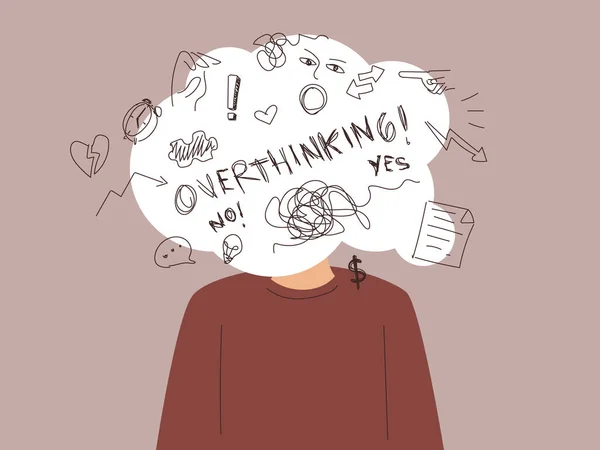Overthinking: As human beings, we all experience the highs and lows of life. Sometimes we are happy, and other times we are not. We all have those days when we feel like nothing is going right, and we just can’t shake off the negative feelings. However, many of us fail to realize that our overthinking is often the biggest cons of our unhappiness. In this article, we will explore the negative impact of overthinking and provide tips to overcome it and improve your everyday motivation.
Understanding Overthinking
Overthinking is a habit that many of us have developed over time. It involves dwelling on negative thoughts, experiences, and possibilities, often leading to feelings of anxiety and stress. We tend to replay situations in our minds, trying to find a solution to a problem or figuring out what went wrong. Unfortunately, this only leads to further frustration and negative emotions, making it difficult to focus on anything else.

Impact of Overthinking on our Happiness
Overthinking not only affects our mental health but also impacts our physical well-being. When we overthink, we produce stress hormones that trigger our fight-or-flight response. This response was designed to protect us from danger, but when it is activated frequently, it can cause physical symptoms such as headaches, muscle tension, and digestive problems. Overthinking can also lead to decreased productivity, as we become stuck in a cycle of worry and self-doubt.
Ways for Overcoming Overthinking for Happiness
Do you find yourself daydreaming about the past and fretting about the future? If this is the case, you may be suffering from the unpleasant symptom of overthinking. This negative thinking pattern can make us feel overwhelmed and unhappy, but these are steps we can take to break the cycle of overthinking and recover our peace of mind:
Practice mindfulness – The practice of being present in the moment and focusing on our thoughts and feelings without judgment is known as mindfulness. It can assist us in becoming more aware of our thoughts and letting go of negative thought patterns.
Being mindful and staying in the present moment can assist in breaking the negative thought cycle. Instead of ruminating and worrying, concentrate on what is going on right now. Pay attention to your surroundings, your breathing, or even a mundane task like washing dishes or taking out the garbage. This can help you get out of a rut and stop overthinking.
Challenge your thinking habits – Overthinking causes us to focus on the worst-case scenario. We can learn to see things in a more positive light and reduce our anxiety by challenging these negative thoughts.
It is critical to identify and challenge thoughts that do not serve you well. If you have negative thoughts, ask yourself if they are true or consider what evidence exists to support the thought. Instead of catastrophizing, reframe these situations in a more positive light and look for solutions. Recognize that no situation is completely good or bad; this will allow you to see more opportunities.
Take actionable steps – Overthinking frequently leads to inaction. We can break the cycle of overthinking and start moving forward by taking action and making decisions.
Overcoming unhappiness requires taking a proactive approach to improving your situation. Make a plan and take small steps towards the bigger picture of how you want to feel each day. This will give you a sense of control over the things that are making you unhappy and will assist you in moving forward. Begin by setting manageable goals, then track your progress towards them. When things get tough, remember all of the positive changes that are happening and that this feeling will not last forever.
Practice self-care – Self-care is critical for our mental and emotional well-being. This can include things like getting enough sleep, eating a healthy diet, and doing things that make us happy.
Taking time each day to reflect on what you’re grateful for can help increase your feelings of joy and peace. Even in difficult times, gratitude allows us to see the amazing things that are happening in our lives. Consider writing down three things you’re grateful for each night before going to bed or as soon as you wake up in the morning. You can focus on big or small things, such as being grateful for a new friend or a sunny day, and observe how it improves your mood.
Seek professional help – If overthinking has a negative impact on our quality of life, it may be beneficial to seek professional assistance. A therapist can help us overcome our overthinking habits by providing guidance and support.
Seeking help from others is never a sign of weakness. It’s a brave act that shows self-awareness and the desire to move forward. If your overthinking is causing you emotional distress, reach out to supportive friends or family members. Professional counselling can also be extremely beneficial in dealing with troubling mental health issues such as depression or anxiety.
Finally, overthinking can keep us trapped in our heads rather than engaging with the world around us. If we are stuck in our heads, we are unlikely to go out and do things we enjoy, such as spending time with friends, trying new activities, or simply playing outside or exploring nature.
We must take a step back from our thoughts and reconsider whether they serve a healthy purpose in our lives. We must recognise when we are overly focused on unhealthy thought patterns in order to make better decisions about how we engage with the world in ways that bring long-term satisfaction rather than causing additional stress and discontent.
Overthinking is the biggest cons of our unhappiness: FAQs
Q1. What are the causes of overthinking?
A1. Overthinking can be caused by a variety of factors, including past experiences, fear of the unknown, and a lack of self-confidence.
Q2. How does overthinking affect our mental health?
A2. Overthinking can lead to feelings of anxiety, stress, and depression, which can have a negative impact on our mental health.
Q3. Can overthinking lead to physical health problems?
A3. Yes, overthinking can lead to physical health problems such as headaches, muscle tension, and digestive issues.
Q4. Can mindfulness help with overthinking?
A4. Yes, practicing mindfulness can help us stay in the present moment and reduce the tendency to overthink.
Q5. What are some self-care activities that can help with overthinking?
A5. Engaging in activities such as exercise, reading, or spending time with loved ones can help improve our emotional well-being and reduce overthinking.
(Disclaimer: Goalympic Team is updating knowledgeable content in this blog from official sources and is not aiming to promote any particular source or business through this and also, do not hold any copyrighting rights under our names for the content)


